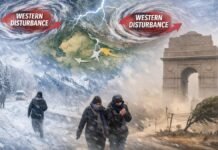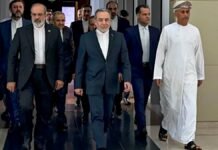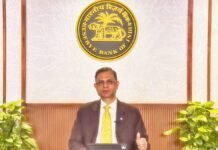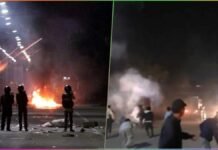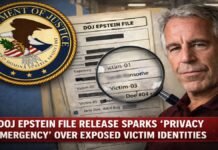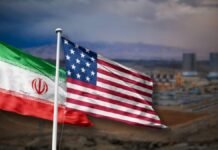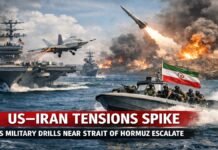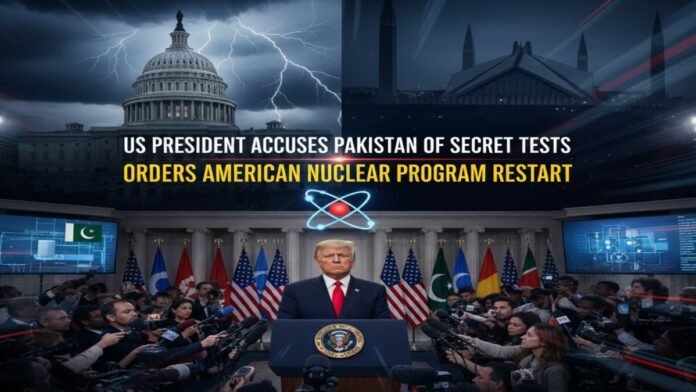
Key Points:
- US President Donald Trump claimed in CBS 60 Minutes interview (November 2, 2025) that Pakistan, Russia, China, and North Korea are actively conducting secret underground nuclear tests
- Trump justified his decision to resume US nuclear testing after 33-year moratorium (last test in 1992), stating America cannot be “the only country that doesn’t test”
- Trump alleged that Russia, China, and Pakistan conduct tests “way underground where people don’t know exactly what’s happening” with barely perceptible vibrations
- Pakistan’s last official nuclear test was May 1998 at Chagai Mountains; Trump’s claim of ongoing secret tests remains unverified and represents first time sitting US president publicly alleged Pakistan continuing nuclear weapons tests
- US Energy Secretary Chris Wright clarified that proposed tests involve “non-critical system tests” and do not include live nuclear explosions or detonations
- Trump ordered Pentagon to initiate nuclear weapons testing “on an equal basis” (announced October 29, 2025) in response to Russian trials of advanced nuclear-capable systems including Poseidon underwater drone
- China officially denied nuclear testing on November 3, 2025, calling on US to maintain Comprehensive Nuclear Test Ban Treaty (CTBT) moratorium
- Trump claimed US possesses “more nuclear weapons than any other country” and enough to “blow up the world 150 times”; Russia has “a lot” and China “quite a bit”
- Trump previously discussed nuclear disarmament with Putin and Xi Jinping but warned both countries continue expanding arsenals
- No country besides North Korea known to have conducted nuclear explosions for decades; Arms Control Association confirmed no country conducted nuclear test since 1992
- Statement raises major concerns in India about Pakistan’s nuclear posture and regional stability in South Asia
Washington: US President Donald Trump has ignited a global nuclear controversy by publicly alleging that Pakistan is conducting secret underground nuclear weapons tests, justifying his administration’s contentious decision to restart American nuclear testing after a 33-year hiatus. The bombshell accusations, made during a CBS News 60 Minutes interview broadcast on November 2, 2025, mark the first time a sitting American president has publicly claimed that Pakistan continues nuclear testing, potentially straining Washington’s already complex relationship with Islamabad while heightening regional tensions across South Asia.
Allegations of Secret Underground Testing
During his CBS 60 Minutes interview, Trump made sweeping claims about the nuclear testing activities of multiple nations, placing Pakistan alongside Russia, China, and North Korea as countries allegedly conducting clandestine nuclear weapons tests. Trump stated emphatically: “We’re going to test because they test and others test. And certainly North Korea’s been testing. Pakistan’s been testing”.
When challenged about his lack of concrete evidence, Trump acknowledged the covert nature of these alleged tests, explaining: “They test way underground where people don’t know exactly what’s happening with the test.. You feel a little bit of a vibration. They test and we don’t test. We have to test”. This description of undetectable underground testing suggests Trump is referring to tests conducted at depths and scales designed to avoid international detection systems.
Transparency vs. Secrecy Argument
Trump positioned the United States as uniquely transparent compared to other nuclear powers, arguing that America must announce and discuss its nuclear testing because of the free press and open society structure, whereas other nations with authoritarian systems can conduct tests in secret. “Russia’s testing and China’s testing, but they don’t talk about it. We’re an open society. We’re different. We talk about it. We have to talk about it because otherwise you people are going to report. They don’t have reporters that are going to be writing about it,” Trump explained.
This framing suggests that Trump believes the asymmetry in transparency itself justifies American nuclear testing as a matter of strategic parity.
Pakistan’s Historical Nuclear Testing
Pakistan last conducted public nuclear weapons detonations in May 1998 in the Chagai Mountains region, following India’s Pokhran-II tests that same month. This bilateral nuclear arms race established Pakistan as the first Islamic state to possess nuclear weapons and transformed South Asia’s security architecture overnight. However, since 1998, Pakistan has not announced any new nuclear tests, maintaining its long-standing position that its nuclear programme is purely defensive and subject to strict command-and-control mechanisms.
No Official Pakistani Response Yet
As of the latest reports, Pakistan has not issued any official response to Trump’s accusations regarding alleged ongoing nuclear testing. This silence stands in contrast to China’s swift and categorical denial of nuclear testing allegations. Pakistan’s delay in responding may reflect strategic calculation about how to address allegations from a sitting US president without provoking further controversy or inadvertently confirming suspicions.
China Categorically Denies Testing
China responded swiftly to Trump’s allegations, issuing an official denial on November 3, 2025. Chinese officials stated categorically that China is not conducting nuclear weapons tests and called upon the United States to maintain its moratorium under the Comprehensive Nuclear Test Ban Treaty (CTBT). This stark contrast between China’s immediate and emphatic denial versus Pakistan’s silence highlights different diplomatic strategies in responding to Trump’s provocative claims.
Trump Orders Pentagon to Resume Testing
Trump’s announcement on October 29, 2025, that he had “instructed the Department of Defense to initiate our Nuclear Weapons testing on an equal footing” sent shockwaves through the international community. This decision marks a dramatic reversal of decades of American nuclear non-proliferation policy and the commitment to the CTBT, which the US has signed but not ratified.
Trump justified this extraordinary decision by citing recent Russian trials of advanced nuclear-capable systems, particularly the Poseidon nuclear-powered underwater drone, which Russia has announced with considerable fanfare. Trump argued that American weapons systems require regular testing to maintain reliability and effectiveness: “You have to see how they work. The reason I’m saying testing is because Russia announced that they were going to be doing a test”.
Last US Nuclear Test: 1992
The United States last conducted an underground nuclear weapons test on September 23, 1992, at the Nevada National Security Site. This represented the end of a testing program that had continued throughout the Cold War and briefly beyond it. For more than three decades, the US maintained a de facto moratorium on nuclear testing, a practice now proposed to be abandoned under the Trump administration.
Energy Secretary Clarifies “Non-Critical” Testing
Recognizing international concern and confusion about Trump’s announcement, US Energy Secretary Chris Wright issued a clarification in a Fox News interview, stating that the administration’s nuclear testing proposal does not involve traditional nuclear weapons explosions. Instead, Wright explained that the planned tests would be “non-critical system tests, non-critical explosions” designed to ensure the proper functioning of non-explosive components of nuclear weapons.
“These are system tests, non-critical explosions,” Wright elaborated. “They involve all other parts of the nuclear weapon to make sure they deliver the right geometry and safety functions”. This clarification suggests that the Trump administration envisions testing of conventional explosives and weapon systems components rather than full-scale nuclear detonations that would generate seismic signatures detectable by international monitoring networks.
Historical Context: Last Global Nuclear Test
According to the Arms Control Association, no country has conducted a nuclear explosion test since 1992 (when the US conducted its last test). Even North Korea, often cited by Trump as an active nuclear tester, declared a moratorium on nuclear weapons testing in 2018, though it has conducted conventional explosives testing of nuclear weapon systems. This historical fact contradicts Trump’s characterization of ongoing nuclear detonation tests by multiple countries.
Trump’s Nuclear Arsenal Claims
Trump emphasized that the United States maintains the world’s largest nuclear arsenal, claiming that American nuclear weapons are sufficient to “blow up the world 150 times”. He asserted that Russia, while maintaining “a lot” of nuclear weapons, possesses fewer than the United States, and that China has “quite a bit” but substantially fewer than either the US or Russia.
Trump’s quantification of destructive capacity reflects a Cold War-era logic of nuclear deterrence based on mutual assured destruction (MAD), wherein overwhelming destructive capacity itself becomes the basis for security.
Previous Discussions with Putin and Xi
Trump referenced previous conversations with Russian President Vladimir Putin and Chinese President Xi Jinping regarding nuclear disarmament, claiming to have discussed reducing global nuclear arsenals. However, Trump warned that despite these discussions, both countries continue expanding their nuclear capabilities and weapons development programs. This framing suggests that Trump views resumed American testing as necessary to prevent other nuclear powers from gaining a strategic advantage while the US maintains restraint.
Geopolitical Implications for South Asia
In India, Trump’s statement regarding Pakistan has given credence to New Delhi’s long-standing concerns about Islamabad’s nuclear posture, which Indian officials have consistently characterized as destabilizing and irresponsible. Indian Defence Minister Rajnath Singh has previously urged international bodies like the International Atomic Energy Agency (IAEA) to monitor Pakistan’s nuclear arsenal, citing the threat it poses to regional stability.
Trump’s public allegations appear to validate India’s concerns about Pakistan’s nuclear weapons development and potential ongoing weapons refinement activities. If substantiated, evidence of ongoing Pakistani nuclear testing would suggest that Islamabad continues actively developing and improving its nuclear arsenal, contrary to international expectations that nuclear powers would maintain testing moratoriums.
Strategic Ambiguity and Verification Challenges
A critical challenge with Trump’s allegations is the fundamental problem of verification; nuclear testing conducted at sufficient depth underground is designed to avoid detection by international seismic monitoring networks that monitor the CTBT. Trump himself acknowledged this opacity when explaining that such tests produce “a little bit of a vibration” that observers “don’t know exactly what’s happening with”.
This creates a situation where Trump can make unsubstantiated allegations about secret testing that are, by their nature, difficult or impossible to definitively verify or refute.
International Reaction and CTBT Concerns
The Comprehensive Nuclear Test Ban Treaty Organization (CTBTO) and international arms control advocates have expressed serious concern about Trump’s proposal to resume American nuclear testing. Such action would represent a major setback for non-proliferation efforts and could trigger a cascade of other nuclear powers abandoning the de facto testing moratorium that has held since 1992.
China’s immediate call for the US to maintain the CTBT moratorium underscores international opposition to Trump’s testing plan. Even nations skeptical of some arms control measures recognize that a return to large-scale nuclear testing would fundamentally destabilize the current international security environment.
Timing and International Context
Trump’s announcement came just minutes before he met with Chinese President Xi Jinping in South Korea, suggesting deliberate timing to signal American resolve and strength during high-stakes bilateral negotiations. The dramatic announcement format via social media rather than formal diplomatic channels reflected Trump’s characteristic communication style but also risked creating international alarm and confusion about American nuclear intentions.
Unresolved Questions
Several critical questions remain unanswered following Trump’s statements:
- Evidence Base: What specific intelligence or evidence supports Trump’s claims about Pakistan conducting secret nuclear tests?
- Detection Methods: How would underground tests be detected if they are conducted at depths designed to avoid seismic detection?
- Policy Objectives: What specific national security objective would resuming American nuclear testing achieve?
- CTBT Implications: Will the US formally withdraw from or suspend its commitment to the CTBT moratorium?
- Regional Stability: How will Trump’s testing announcement affect the delicate balance of nuclear deterrence in South Asia?
Broader Strategic Context
Trump’s statements on nuclear testing must be understood within the broader context of his revisionist approach to Cold War-era arms control agreements and deterrence doctrines. The Trump administration has been skeptical of many international agreements, viewing traditional arms control as constraining American strategic flexibility.
The proposal to resume nuclear testing represents a significant departure from the post-Cold War consensus that maintaining a de facto testing moratorium served American interests by limiting other nations’ ability to develop advanced nuclear weapons. By resuming testing, the US would eliminate one of the few remaining constraints on global nuclear weapons development, potentially triggering a new era of nuclear arms competition.
Path Forward
As international leaders and experts digest Trump’s startling claims and policy proposals, the implications for global nuclear security remain uncertain. Whether Trump’s allegations about Pakistan will be independently verified, how other nuclear powers will respond to resumed American testing, and whether international pressure can constrain this policy direction remain to be seen. What is clear is that Trump’s comments have introduced unprecedented uncertainty into an already fragile global nuclear order.




